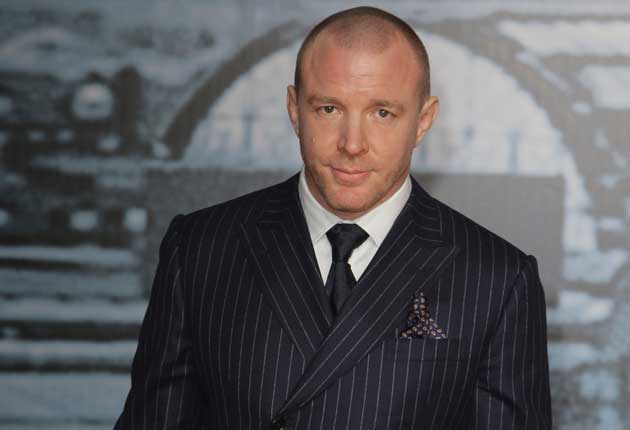Why owning a label isn't all RocknRolla
Guy Ritchie's foray into the music industry may be an ill-advised move. Others have tried and failed, writes Fiona Sturges

There is a certain inevitability to the news that the film director Guy Ritchie is launching his own record company. Given that he's spent the past 10 years married to Madonna, you imagine he'd have picked up a thing or two. The label is to be called Punchbowl Records, after the pub that Richie owns in London's Mayfair, and his first signing will be the in-house group The Punchbowl Band, who also appear on the soundtrack to his latest film, Sherlock Holmes.
It's a gamble for Ritchie, even with his experience and successful films like RocknRolla. Launching a record company is an enterprise that seems to promise rich rewards and yet is rarely a success.
Not convinced? Just ask Noel Gallagher, whose label, Sour Mash, failed to make an impact with releases by Proud Mary and Shack, or Mariah Carey, whose Crave label dissolved in less than a year, or George Michael, whose mid-Nineties plans to sell music on the internet through his record company, Aegean, proved just a few years ahead of their time.
For the more vainglorious star, a record label can be a perceived path to instant credibility, and can end up being an arm of a vast business empire which might already include a clothing range, a fragrance and a clutch of ghost-written biographies.
It's no wonder that it's become common practice for major record companies to allow their most bankable stars to launch subsidiary labels – known as "vanity labels" – where he or she can sign the artists that they most admire. It can be a smart way to massage a pop star's ego while keeping hold of their business in the long-term. These labels can be very successful too, not least because they're shored up by in-house legal, finance and marketing teams with years of experience between them.
In 1992 Nine Inch Nails' Trent Reznor started Nothing Records, as a subsidiary of Interscope, and hit early paydirt with Marilyn Manson. Under the watchful eye of Universal, Dr Dre's Aftermath Entertainment famously signed Eminem, who went on to start his own Shady Records, through which he launched 50 Cent.
But plenty of vanity labels have struggled to make such an impact. Grand Royal, a joint venture between the Beastie Boys and Capitol Records, had short-lived success before becoming submerged in debt. Two years ago Justin Timberlake announced the launch of Tennman Records, a joint venture with Interscope. It has so far failed to produce any artists of note.
If anyone should be au fait with the risks involved in starting a label, it should be Ritchie. After all, Madonna had her fingers badly burnt when in 1992 she set up her own label, Maverick Records. It generated hits by Alanis Morissette and the Prodigy. Then her relationship with the parent company, Warner Bros, soured, culminating in a legal dispute that ended with Warner buying Madonna out.
The vanity label doesn't always have to be about inflated egos and bad business decisions, though.
In the case of David Byrne's Luaka Bop label, it was an attempt to open Western ears to sounds from around the world, something that he has managed consistently for 21 years.
Enjoy unlimited access to 100 million ad-free songs and podcasts with Amazon Music
Sign up now for a 30-day free trial. Terms apply.
ADVERTISEMENT. If you sign up to this service we will earn commission. This revenue helps to fund journalism across The Independent.
Enjoy unlimited access to 100 million ad-free songs and podcasts with Amazon Music
Sign up now for a 30-day free trial. Terms apply.
ADVERTISEMENT. If you sign up to this service we will earn commission. This revenue helps to fund journalism across The Independent.
Perhaps the best-known success story is Frank Sinatra, who showed serious business savvy in his creation of Reprise in 1960. Among Reprise's founding principles were that artists, including fellow Ratpackers Dean Martin and Sammy Davis Jr., would retain all rights to their work and have full creative freedom. Sinatra's biggest coup, however, was selling the company to Warner records for $1m along with a sizeable stake in all future signings.
But even the fate of the Beatles' Apple Records, which was incompetently run and descended into financial chaos before being resolved after years of litigation, hasn't stopped hordes of artists drawing up business plans.
Amy Winehouse recently launched Lioness Records, with her goddaughter Dionne Bromfield as the first signing. Last October Lily Allen announced she wouldn't be making any more albums and was planning to set up her own imprint, while the Kings of Leon are also adding a record company to their growing list of business concerns.
It just remains to be seen whether their new enterprises – and Ritchie's – will prove indulgent folly or their best career moves yet.
Join our commenting forum
Join thought-provoking conversations, follow other Independent readers and see their replies
Comments
Bookmark popover
Removed from bookmarks